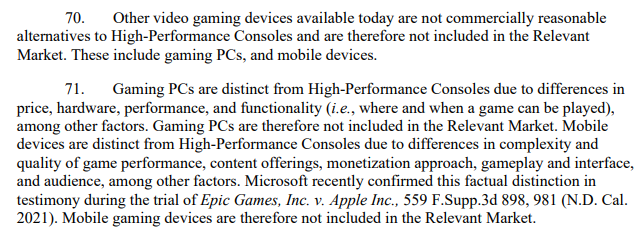
This is a hard sell for me, and I think something Microsoft will push on, as it feels factually inaccurate. They will likely have numbers of players on PC vs console.
Especially as the FTC is pushing part of the complaint as Microsoft’s streaming service becoming a monopoly as part of this deal, yet focus a TON on how there are only 2 places that GAMERS™ play games.
Completely discarding the PC as a viable option for gamers is just plain false, and wrong, and I suspect that Microsoft will push very hard how much they have expanded the ability to connect to gamepass on many devices. This hurts the FTC’s argument that they are trying to push people away from a PS5 and onto an Xbox Series X.
The argument they are making almost feels like a joke written by a ResetEra poster. It is hilariously one-sided in its analysis. (I mean, it is supposed to be, but it reads like a forum post)
I would argue that the FTC is completely missing the point with the large bulk of this argument. Trying to argue that gamers are going to be forced onto 1 console in the future as a monopoly is just wrong. The future of gaming is moving away from high performance consoles and onto streaming, and Microsoft has shown how they basically only want to expand your possibilities in connecting to their subscription service. I would expect their rebuttal will show that Sony has refused to allow them to put their game-pass streaming on the PS5, as well as the difficulties they have had with cross-compatibilty with Sony’s consoles.
Sony was extremely “anti-competitive” during the PS4 era. Locking down the playstation services and gamers into a silo unable to connect to other consoles or PC. This was (and still kind of is) a shitty thing to do, and super anti-consumer. And done in a way to drive people to purchase ps4’s. I am sure Microsoft will bring up how consumer friendly they have been very recently.

This statement will likely be argued by Microsoft and lawyered up. It is also a bit weaker since they are arguing that microsoft’s past behavior of private assurances are equal to its currently very public assurances that they are guaranteeing CoD on Sony consoles for the next 10 years. I am sure this was written before that was publicly stated.
To me, this is the strongest argument.

Stating that most AAA games come from 4 independent publishers, and this purchase would change that number to 3. That is a big deal, huge.
Though, I would hope that if this is successfully blocked none of those companies they have just stated, EA, Activision, Take-Two, and Ubisoft cannot be purchased by any console manufacturer in the US.
And they erode that argument a bit further down…

Oh … don’t forget about Epic and Fortnite… someone who we didn’t push as one of the only AAA developers. What about Riot? Tencent? Bandai-Namco (which has revenues higher than Take-two) Hell Valve?
They also do not mention Sony’s purchase of Bungie, as Destiny is certainly considered a AAA title. I am certain Microsoft will point this out.
There are a lot of holes to this argument, and I think that Microsoft will focus on those a lot.




